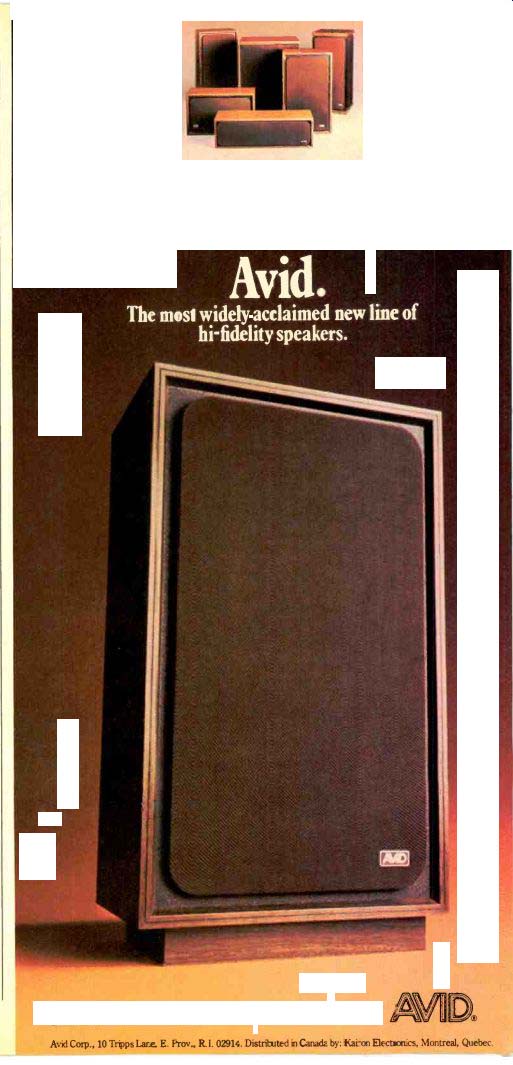.
Speaking of Techniques
To talk of a "bravura production line" sounds a little odd, but that's just what we encountered on a recent trip to Japan as one of the guests of Technics.
The full brand name, as most readers must surely know, is Technics by Panasonic; and Panasonic, in turn, is the brand name used in North America by Matsushita Electric.
(In most of the rest of the world National or National Panasonic is used.) Matsushita is one of the world's largest corporations, and therein lies the paradox of Technics. While innovation, particularly in this country, often comes from the smaller "specialist" companies devoted exclusively to quality components, Technics is both giant and specialist.
In its plants we were regaled with the performance achievements in forthcoming products and with the astonishingly automated production lines. Matsushita's corporate philosophy, it appears, is to increase both the quantity and the quality of its products, wherever possible, without new personnel (and hence added costs) by designing machinery to accomplish mechanical tasks and moving the liberated operators on to new-and, one hopes, more challenging-tasks. Because its vast resources include in-house design and construction of such automated fabrication and checkout equipment, Matsushita can do things on its production lines that, presumably, small companies could not; because its resources also include heavy investments in research, new-product development can take a very different course from that at the smaller specialty companies.
We were bemused by the difference when, shortly after our return, a spokesman for one of the most respected small American component houses talked to us of his "mad-scientist president"-an epithet applied with some affection. The genus, far from facing extinction in the high fidelity industry, often is conceived of as a necessity for the industry's survival. At Technics we encountered no mad-
scientist syndrome; what we did encounter was enthusiasm, industry, ingenuity, and the evident determination to become leaders in every aspect of stereo reproduction not just in such specifics as direct-drive turntables, where Technics already occupies a unique niche.
One cannot walk along tie Technics production lines watching machines pop resistors and capacitors into place on circuit boards or, lights flashing, check out a whole series of parameters on a completed board or stack those that pass the tests neatly to one side while it sets those that don't at the other for human investigation--without being impressed. Far from the conventional cookie-cutter, all of whose defects are perforce imposed on all product, this approach presumes a higher degree of quality control, step by step during the manufacturing process, than any high fidelity production line we can recall.
But, curiously, even this automation was not what impressed us most. We had arrived in Osaka, Matsushita's home city, on Sunday evening. Just after lunch on Monday we went to the first of several technical briefings. The pro gram began with a multi-projector slide film designed to de fine Technics' image of itself as background for all that we were to see and hear in the next few ,clays. Suddenly, as part of the presentation, there we were, on slides, emerging from the Osaka airport. Between Sunday night and Monday noon they had taken the pictures, had them rush-processed, and integrates them into an elaborate slide film. That's class. Aside from the ego trip involved, it displayed-perhaps more clearly than anything else we saw in Japan-that Technics has the resources to accomplish just about anything it has a mind to do.
Tape Ripoffs, Continued
Copycatting of established brands of tape has turned out to be more widespread than we had supposed. Maxell has an imitator based somewhere in the Far East that styles it self Maxwell (with a w) in order to prey on the unwary. The similarity of the two names is sufficient to confuse the hasty shopper, who then owns a poor-quality cassette and is totally without recourse, a Maxell spokesman warns--so it pays to watch spelling as well as package style.
In the meantime, another predator (besides KDK, on which we reported in January) has come to light in TDK clothing, this one calling itself Skymaster. Indications are that there are other bogus names and that Maxell and TDK are not the only brands being imitated. We will try to keep you posted. We can only hope that our readers will protect themselves by using their eyes and their heads and making sure that they are buying what they think they are.
Victor Brociner Dies
Victor Brociner, one of the pioneers and guiding spirits of the high fidelity industry-and our "High Fidelity Path finder" last September--suffered a fatal heart attack November 24. He was sixty-six years old. Of late vice president for engineering and stereo products of Avid Corporation, Providence, Rhode Island, Brociner had a long and distinguished career as a uniquely creative engineer. With Avery Fisher and a third partner, he founded Philharmonic Radio. He later headed his own company and subsequently was associated with University Loudspeakers and H. H. Scott. A high fidelity innovator for forty years, he will be sorely missed.

++++++++
(High Fidelity, Mar. 1977)
Also see: